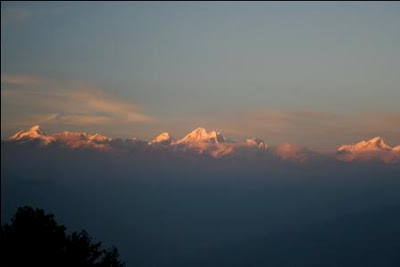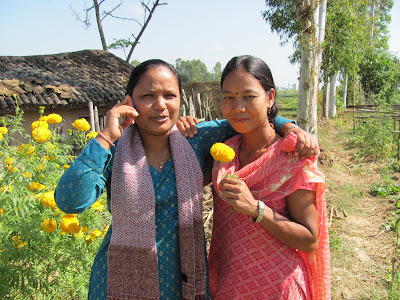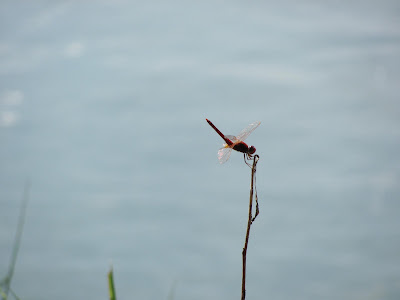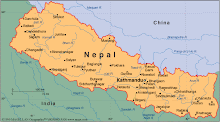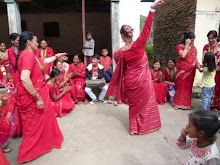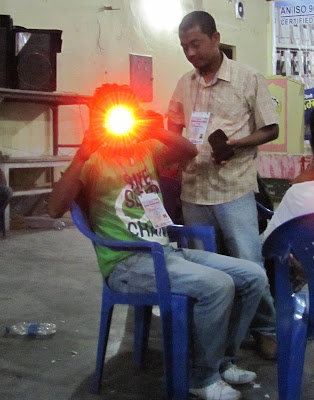
Photo above: A picture of a stranger taking an unannounced snapshot of me.
A few things that have come into clearer focus about myself during this last year in Nepal. One, change really can be difficult for me and I think I adjust slower to change than some. Second, I am a really sensitive person.
It's Tihar holiday here right now and, by all accounts, my favorite holiday that I've experienced so far in Nepal. It is the festival of lights. Of sweets, cleaning homes, welcoming the goddess Laxmi (goddess of wealth), joy, singing, dancing, honoring the dog, honoring the crow, honoring cows, honoring the connection between sisters and brothers, and of 7-colored tikkas.
My neighborhood which is normally quiet and deserted by 7:30 pm every evening has been alive with candles, constant singing, and fireworks every night the last 3 nights until at least midnight. Everyone seems to be participating and having fun - the children, the women...
This is the stuff I *love*. I've had more invitations than I could count to singing and dancing rounds, puja (rituals) in private homes, new year's celebrations, dinners, and people's village homes. But I haven't accepted any of them. Because honestly, I am still recovering from Deshain (the last holiday).
Many parts of Deshain were fabulous. I got a window into people's lives and communities that few people would ever get to see. But it was also in equal measure a bit traumatizing for me.
Every day I am horrified by the inequalities between women and men here. I put on my best analytical thinking skills and tell myself: it's a different culture and I can't compare. Change happens slowly - and positive change is happening here (which it is). But in my heart, I find the way that most women are treated here (by too many, but not all men), heart-wrenching.
And as I get to know Nepali women better, they share their own personal stories with me and confirm that yes - they feel that being a woman in Nepal is extremely, extremely difficult and too often, crippling.
Despite what I was hoping, I spent all of Deshain only with men, because women are only allowed to cook and clean. Men, however, are allowed to travel and visit whoever they want, and they can gamble and drink away the small amount of money that the family has. Often leaving not enough for their children's school clothes and books.
Now, I always do my best about stereotypes and the misconceptions and hurt that these can cause. There are many exceptions to this scenario. But it is the norm way too often, for way too many families, villages, and communities in Nepal.
I also thought that I could stomach animal slaughter better than it turns out I am able. Because - in theory - I think that it is really amazing to be able to be this close to the food that I eat. To catch the fish that is later on my plate. To see the chicken (happy, running free, well taken care of) right before it is killed. To eat a goat that has been truly loved and honored.
In the West I am so removed from the food I eat, and where it comes from. I usually have no idea how it was treated, what food it ate, how it was killed. And - on an intellectual level - I think it is really a gift to be able to witness the full process of an animal's life, which is then prepared as food that sustains me. I have the opportunity to thank the fish and the chicken for giving up their lives so I can eat and be healthy.
When the fish from my friend's pond showed up on the plate in the kitchen ready for preparation, though - still breathing in slowly, not quite dead - on the inside, I lost it.
I didn't show my horror and fear to my hosts. They were showing me a huge honor by sharing their fish and then later, by serving me the fish head (the part of the fish with the most vitamins).
But I was in absolute horror. I LOVE fish. I LOVE animals. This fish had just been swimming happily around in a nice lake surrounded by rice fields and warmed by the sun. Then it was stuck in a bucket, not quite dead, for too long. And now it was on my plate, given to a person who had been fed so much in the last 3 days she couldn't ever imagine feeling hungry again. I could see everything in it's head - the eyes, the gills...as it had just been chopped off and cooked with no other preparation- left for me to figure out how to eat.
I couldn't do it. I just couldn't. I wasn't even remotely hungry, and I felt too connected to the life of the fish. There was nothing I could do to convince myself that I needed to be respectful to my hosts in this particular moment, it just didn't matter to me all of the sudden.
So I did the only thing I could do. I put it on my friend, Casper's, plate when I was hoping no one was looking. He didn't want it either, but owed me a favor.
I don't know why this experience in particular was so traumatizing for me. It is multi-layered. For one, I was feeling really sad about watching the fish die when - in my opinion - it was completely unnecessary. But I think that I am equally exhausted sometimes by being the perennial guest-of-honor.
It sounds ungrateful to say this. The true generosity of people and what they are willing to share with me and do for me is something I have never experienced before in my life. I have been brought to tears by people's kindness and willingness to share of themselves in such a real, honest, and meaningful way many times. And for those who know me well, I don't cry very easily.
But I'm starting to not like eating meat as much (which is what you give guests), and often the amount of food I am given is more than I can ever eat. So I'm stuck with either a) eating and doing things I don't want to and lying and pretending that I am happy or b) appearing ungrateful and potentially offending my hosts. I almost always usually choose the former, trying to find the perfect time when I can say, without lying, "I LOVE the food, I just am full and can't eat any more now". But it doesn't always work out so easily in reality.
This Tihar holiday, I've decided to give myself a bit of a rest from being the foreigner and the guest. I am giving myself a rest from answering the same 5 questions from every person (no, I am not married and actually, I am very happy with my life just as it is), strangers constantly taking my picture everywhere I go (I know it is only curiosity, but sometimes I feel like a zoo animal), and from trying to eat too much food so that I can make my hosts happy.
I am watching all the singing and dancing in the neighborhood from my balcony, cup of tea with herbs from home, potatoes and eggs on the burner inside, music from my laptop keeping me company. And I am happy. Contemplating, recovering, resting up, preparing.
I can enjoy Tihar on the streets and villages next year....

